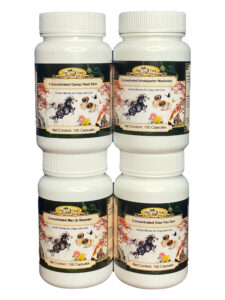Herbal Therapy
- Herbal therapy can be defined as the use of individual herbs or herbal formulas and their thermogenic as well as therapeutic properties to gradually correct a patient’s TCVM Pattern (Bian Zheng) and return a patient’s health to a balanced state.
- Originating from the medicinal properties of food, herbal medicine can come from many sources. However, the most common source is vegetative and mineral-based and can include items such as plants (all parts – flowers, stems, and roots), fruits, shells, and rocks!

History
- Herbal therapy (specifically Chinese herbal therapy) originated from China during the Xia-Shang Dynasty (2070-1046 BCE) and is approximately 3,500 years old!
- Ancient Chinese characters were written on bones and turtle shells during that time (paper did not arrive until the Han Dynasty in 206 BCE – 220CE) and the therapeutic properties of herbs were inscribed on these items. By the 11th Century – during the Western Zhou Dynasty – 100+ Chinese herbs were already charted in at least 3 books!
- Over time and using a compilation of many TCM physicians’ medical records and case-based knowledge, a book entitled Shen Nong Ben Cao Jing was written and published that contained 365 medicinal herbs, some of which are still used today.
When and how is herbal therapy used?
- Herbal therapy can be used by itself or used in conjunction with other TCVM modalities. It is frequently used to prolong the effects of acupuncture in between treatment sessions and is often considered analogous to having “daily acupuncture treatment” due to the effects it can have on both the TCVM organs and overall body. For example, if a patient has a TCVM hepatic (liver) condition, acupuncture points such as Bladder 18 and Liver 3 can be instituted during a treatment session to address this underlying issue. However, that same patient can receive an herbal formula (i.e. Chai Hu Shu Gan, Yi Guan Jin) and it would be as if these acupuncture points were being stimulated daily due to the effects that these herbals have on this TCVM organ.
- Contingent on the patient’s TCVM Pattern determined at the time of examination, an appropriate herbal is selected to “balance the Pattern”. For instance, if the patient has a Spleen Qi Deficiency, then an herbal to tonify Spleen Qi is selected.
- By selecting an appropriate herbal and balancing the patient’s TCVM Pattern, this should correspond to improving the patient’s condition, thereby returning them to an improved state of health. Using the same example above, many patients that have a Spleen Qi Deficiency exhibit clinical signs of vomiting and diarrhea. If an appropriate herbal is selected to tonify Spleen Qi, then the observed vomiting and diarrhea should resolve with the use of the herbal regimen.
What does an herbal look like and how is it given?
Herbals can be administered in various forms including powders, capsules, teapills, and tinctures (i.e. liquids). Regardless of its form, most herbals are consumed orally (taken by mouth) and given multiple times a day. For our pets, these herbals can be mixed into food (like canned pumpkin or bone broth) or if they are sensitive to odor or taste, they can often be baked into a pet-friendly cookie or cupcake for ease of administration.
Horses and most livestock are usually the easiest to give herbals to as they are mixed over their daily feed, while cats and some exotic pets can be the most challenging as they tend to not like the taste or texture. Thankfully, Dr. Levin- Russo has solutions for most of her patients and can work with the pet parent on what will be easiest for them.
Can I use herbal therapy with my pet’s current supplement(s) and medication(s)?
It will depend on the supplement(s) and/or medication(s) that your pet is receiving at the time herbal therapy is recommended. In general, herbal therapy can safely be used with MOST conventional supplements and medications; however, there are some considerations that will need to be made for patients with previously diagnosed cardiac or endocrine diseases.
At the time of the initial consultation, Dr. Levin-Russo will review all of your pet’s current medications and determine if herbal therapy is or is not appropriate for your pet’s medical condition with their current conventional medication regimen.
Is herbal therapy safe? Are there any side effects?
Generally speaking, most herbs/herbal formulas originate from naturally grown plants. If these plants are acquired and processed from a reputable source (i.e. companies that uphold Good Agricultural and Manufacturing Practices), are prepared into appropriately calculated formulas that are designed and intended for animals, and then are shipped/handled properly, then the final product(s) are fundamentally considered safe to consume.
Moreover, for their efficacy, herbal formulas need to be prescribed to a patient with the correct TCVM Pattern Diagnosis. If an incorrect herbal is given to a patient, then the herbal itself is not likely to cause disease or harm to the patient, however it will not work or improve the patient’s condition as intended.
Side effects, if any, are typically minimal in nature and are normally gastrointestinal related such as inappetence, nausea, vomiting, or diarrhea. When beginning herbal therapy, Dr. Levin-Russo will discuss any other specific side-effects or precautionary measures that need to be addressed contingent on the herbal therapy recommended for your pet.
How much should I expect to spend on herbal therapy?
As the traditional saying in TCVM goes, “it depends”. Herbal formulas are typically available in a variety of forms and thus, the pricing for each option will vary. By and large, the powder forms are usually the most cost effective and the capsules and tinctures tend to be the most expensive due to the additional overhead of how they’re formulated and packaged.
Every client is entitled to an estimate prior to committing to herbal therapy; thus, please do not hesitate to inquire about this at the time of the initial consultation. Dr. Levin-Russo can develop a treatment plan with an estimate of the recommended herbal therapy/therapies and their ideal forms prior to ordering anything for your pet.
If there is any financial concern regarding purchasing herbal therapy for your pet, please do not hesitate to let Dr. Levin-Russo know in advance as she can work with you to determine the most cost-effective way to pursue herbal therapy if this is something that you want as part of your pet’s treatment plan.
How long is an herbal administered? How many will I need?
As the traditional saying in TCVM goes, “it depends”. Contingent on the type of condition that your pet has (i.e. Excess, Deficiency, or multifaceted), as well as how complex the TCVM Pattern (or Patterns) is/are, your pet may need to receive an herbal (or multiple herbals) from one month, to several months, to the remainder of their lifetime. At your pet’s initial consultation, Dr. Levin-Russo will discuss if herbal therapy is a good option for your pet, the length of time it may be indicated for, as well as how many herbal therapies your pet could benefit from.
Where do I purchase herbal formulas?
When Dr. Levin-Russo prescribes or recommends herbal therapy for your pet, we will work with you to coordinate drop-shipping herbals directly to you.
At this time, we sell herbals from Dr. Xie’s Jing Tang Herbal Inc., a quality herbal manufacturer and distributor out of Ocala, Florida. Further information about this company, their history, and the importance of Good Agricultural and Manufacturing Practices (and how they uphold these benchmarks) can be found on their website.
Given the complexity of logistics, the potential for compromised product handling, as well as herbal sensitivity to environmental changes (i.e. heat, cold, moisture, etc.), Dr. Levin-Russo does not work with any third party vendors in order to ensure that her patients receive the highest quality herbals possible.

